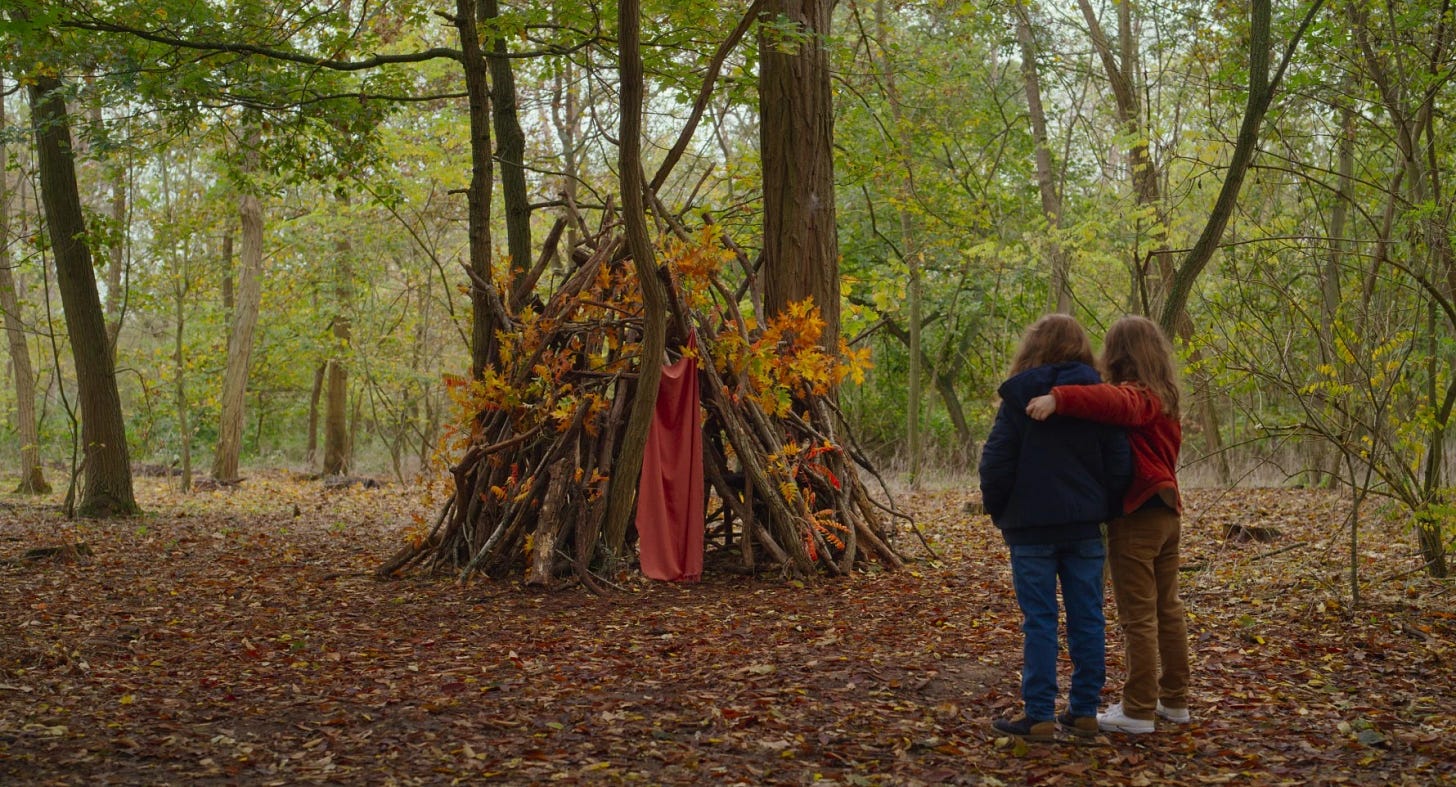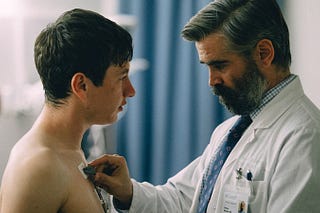
In Review: 'Petite Maman,' 'Memory'
This week, we review two very different films about memory: the latest feature from Céline Sciamma and a new Liam Neeson entry in the cínema du vengeance.
Petite Maman
Dir. Céline Sciamma
72 min.
“You never tell me about when you were children,” eight-year-old Nelly (Joséphine Sanz) complains to her father (Stéphane Varupenne) over dinner one night. He gently pushes back that he and Nelly’s mother (Nina Meurisse) talk about their childhoods all the time. “Yes, but just little stories. Christmas presents you had or if you loved pizza,” Nelly replies. “I don’t know the real stuff.”
She has reason to have the real stuff on her mind. Nelly and her father are spending some time in the home of Nelly’s recently deceased maternal grandmother, cleaning it out and sorting through the arcana of Nelly’s mother’s childhood. Nelly’s mother (Meurisse’s character is credited as simply “mother”) has made an abrupt, unexplained departure, but remnants of the girl she once was surround Nelly. There’s something else going on, too: while searching the nearby woods for the hut in which her mother used to play years before, Nelly encounters Marion (Gabrielle Sanz, Josephine’s twin), a familiar-looking girl her own age, and quickly realizes she’s somehow become able to step into the past to spend time with her mother as a child – a chance to see the real stuff firsthand.
Short but far from sleight, the latest film from Céline Sciamma (Portrait of a Lady on Fire) leads Nelly to no grand revelations or family secrets. Instead it follows her as she comes to understand that her mother was once a kid like her, filled with dreams and fears as she faced an uncertain future. They share something else in common, too: a mother who’s sometimes too distant to be everything Nelly and Marion need her to be. When she follows Marion home, Nelly meets her grandmother (Margo Abascal) of 23 years past and sees the root of some of the sadness that hangs over her mother, both now and then.
In a film of great quietness and small gestures, Sciamma relies heavily on the Sanz twins’ ability to convey wordlessly subtle shifts in emotion. She chose them well. Both girls carry themselves with such unforced somberness that scenes in which they laugh and play convey the ease, naturalness, and depth of the characters’ newfound bond. Able to meet her mother on these intimate new terms, Nelly comes to see in childhood what it sometimes takes a lifetime to recognize: that the bonds connecting us to are parents are stronger than we realize; that where we are in life, they have been; and that where they’re going we’ll someday follow. —Keith Phipps
Petite Maman is in select theaters now and expanding in the coming weeks.
Memory
Dir. Martin Campbell
114 min.
A revenge thriller with Guy Pearce about a man who compensates for his short-term memory loss by etching notes on his body? And the first three letters of the title start with “Mem”? Count me in!
Oh wait.
This is not Memento, the ingenious Christopher Nolan neo-noir about consciousness and our capacity for self-deception. This is Memory, the latest by-the-numbers vehicle for Liam Neeson, who in the 14 years since Taken has reinvented himself as a grim-faced avenger of an older school. (I wrote about this mostly successful transition last year for Washington Post.) The early-onset dementia that Neeson’s assassin experiences in Memory provides a hook for another Taken-like story about one man, with “a particular set of skills,” dismantling an entire criminal organization. Pearce’s casting as his pursuer (and partner) from the FBI seems an acknowledgment from the filmmakers that, yes, they know they owe a debt to the Nolan film. It’s just unfortunate that the connections turn out to be so superficial.
Before its hero’s diminished mental capacity even plays much of a part, Memory is a standard-issue One Last Job/renegade thriller. In his final mission as an expert assassin—the type of gig where retirement isn’t really possible—Alex (Neeson) heads to El Paso, Texas, to pick off two targets. The first he dispatches with relative ease. The second, though, is a teenage girl, and Our Man With a Code refuses to follow through on the contract. That stirs the wrath of his employers, who want the girl dead before she helps expose their sex trafficking operation. On the right side of the law, FBI agent Vincent (Guy Pearce) has been working to crack the trafficking case, and Alex’s involvement puts him in the difficult spot of being philosophically aligned with a killer.
Notice how little the memory part of Memory plays into that plot summary? For long stretches of the film, the audience might forget about it right along with Alex. Directed by Martin Campbell, a solid craftsman whose work includes The Mask of Zorro and two James Bond films, GoldenEye and Casino Royale, Memory goes competently through the motions, with Neeson adding more snapped bones and henchmen carcasses to his collection. At the end of the line awaits the expected cartel sleazebags and corrupt public officials, along with a faintly ridiculous Monica Bellucci as the Final Boss, who experiments in radical de-aging treatments when she’s not covering up her son’s rampant child sex crimes.
Dammit, I forgot about the memory thing again! So here’s that part of it: Alex knows enough about his increasing dementia to adapt a CliffsNotes version of the Memento strategy. When he needs to remember a name, he writes it on the soft underbelly of his left forearm. His lapses are more of an occasional narrative device rather than an all-consuming, narrative-shaping condition, mostly setting up minor twists for later, like when a movie shows a kid uses an inhaler early on so that a climactic, stakes-raising asthma attack won’t feel out-of-nowhere. For Neeson, whose recent work has trended toward the “geezer teasers” that ensnared stars like Bruce Willis and John Travolta, this all feels like an uncomfortable metaphor for a career on the wane. The days of Taken and The Grey are gone. His films now are forgotten at the same pace they unfold. — Scott Tobias
Memory opens in theaters everywhere Friday.

















“Forgotten at the same pace they unfold” — that’s a great line, Scott.